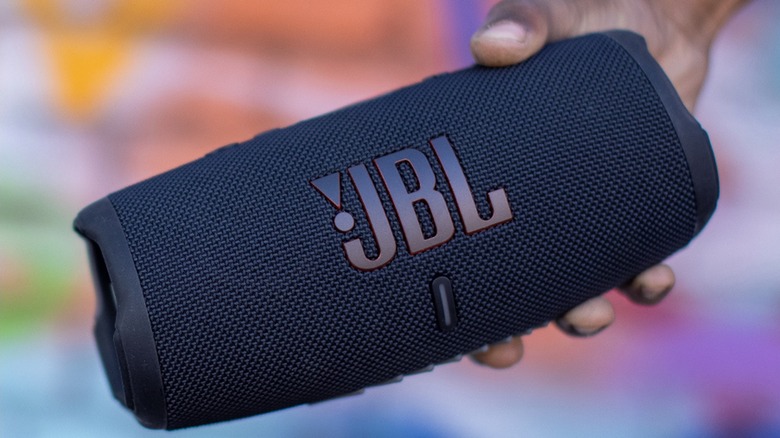What Does 'JBL' Stand For & Who Owns The Speaker Brand Today?
At this point in time, it seems likelier than not that you have owned at least one item that bore the insignia JBL. The brand has, after all, been producing ear-thumping, though sometimes not-entirely waterproof audio gear for the music loving masses for almost 80 years now. Given the company's ongoing successes on both the high-end and low-end of the market, JBL will continue to be a player in the consumer audio arena for the foreseeable future.
Despite the brand's massive market presence, and the fact that most of us have owned JBL products over the years, we'd still lay even odds that not many folks know what the three letters forming that name stand for. Yes, JBL is an acronym and to understand what those three letters mean, you have to take a look at the earliest days of the company's existence. That story begins in California in 1946 when an audio engineer who helped pioneered the earliest sound systems used in Hollywood, and revolutionized the production process of audio equipment used his own name in the formation of a new business venture.
That man's name was James B. Lansing, and the company he founded was James B. Lansing Sound, Inc. Perhaps seeking a name brand that rolled a little easier off of the tongue, Lansing would soon shorten the company's call sign from his full name to just his initials, JBL. In the ensuing decades, those letters have indeed fronted too many audio artifacts to count.
JBL is owned by another major player in the electronics game
James B. Lansing would not be around to see many of those JBL branded artifacts, as the company founder took his own life in 1949. Prior to that unfortunate end, Lansing ensured JBL would survive without him, via a $10,000 insurance policy that allowed company president William Thomas to keep the ship afloat. In Lansing's absence, Thomas began growing JBL in ways that even the JBL founder might not have anticipated, with the company's growth bolstered considerably by the birth of rock and roll, and the new focus on sound quality that accompanied it.
Thomas would go on to serve as JBL's guardian for two full decades. But as the 1960s came to a close, he sold the company bestowed upon him by James B. Lansing. It was another sound pioneer that purchased JBL in 1969, with Sidney Harman officially taking control of JBL. Yes, that Sidney Harman, he of Harman-Kardon fame. In fact, Mr. Harman sold his stake in that iconic audio operation so he could take over JBL. Through every ownership change, JBL has always managed to stay close to its original home base of California.
For the record, Harman is no longer calling the shots at JBL, as the audio legend passed away in 2011 at the age of 92. The company bearing his name is, however, still in charge of JBL. But in 2017, Harman was purchased by Samsung for $8 billion in cash, making JBL and those thumping Bluetooth speakers that made our 2025 best of list a part of the global Samsung machine.

